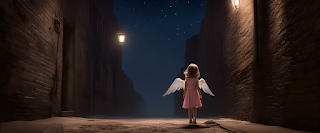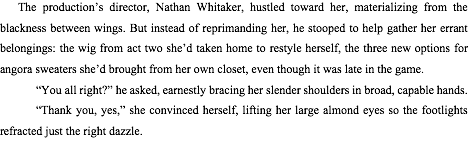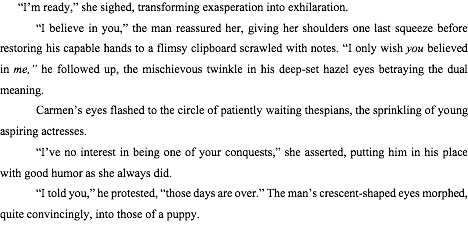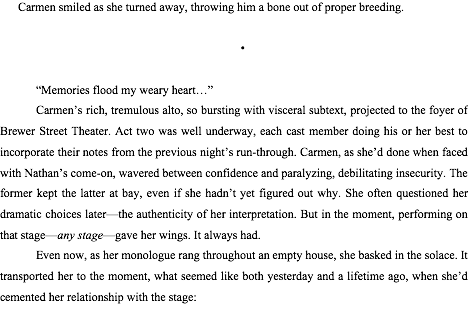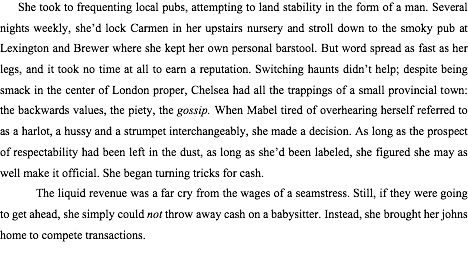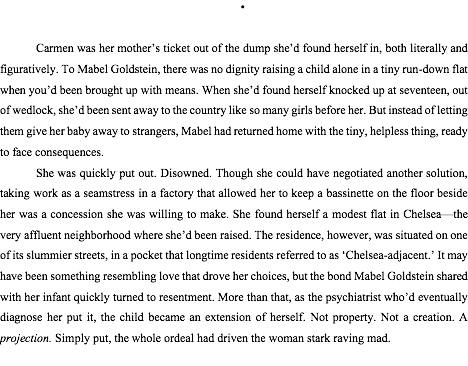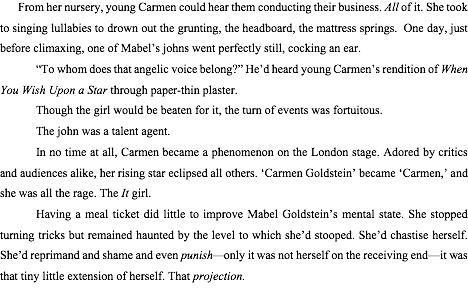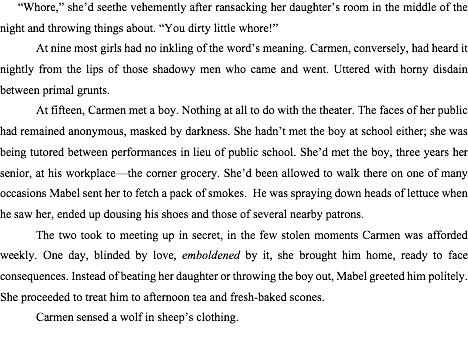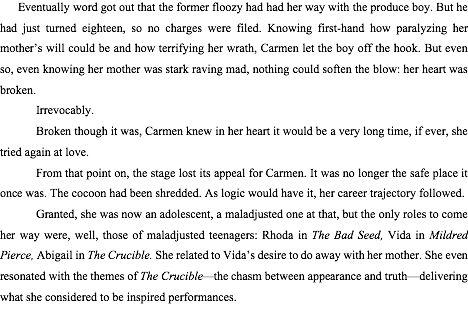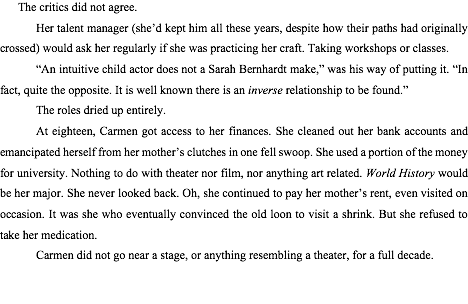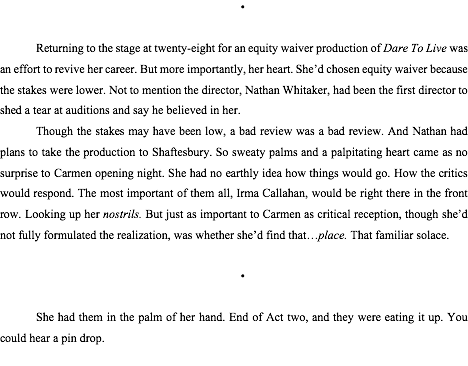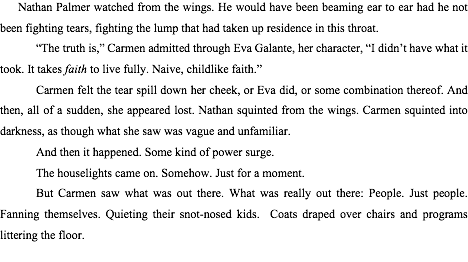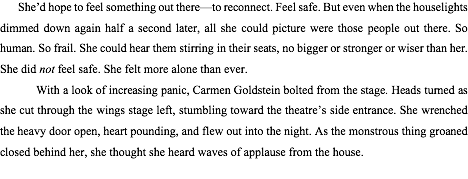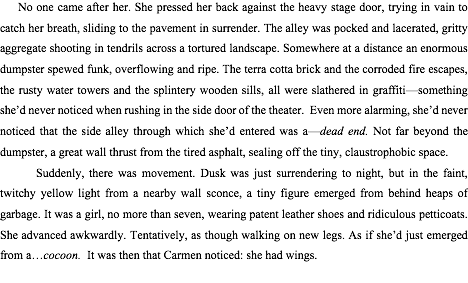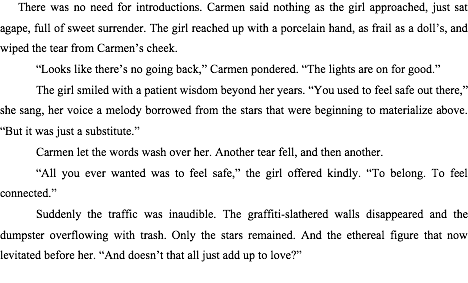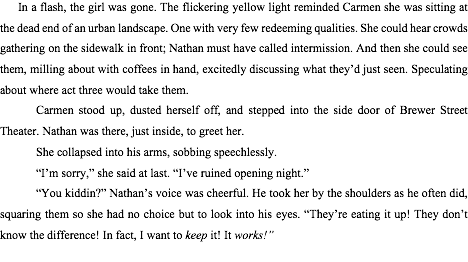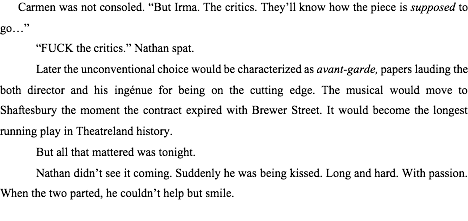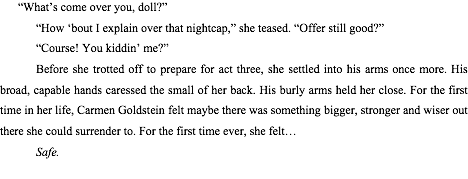Dominick R. Domingo's Blog
March 13, 2024
Need a feel-good story that's dark around the edges but ...
June 14, 2023
Best podcast yet! My books launched June 1st, but I stil...
Best podcast yet! My books launched June 1st, but I still have podcasts and blog talk radio interviews lined up. Johnny Tan's blog has the widest reach and largest platform so far, but more importantly, other than my hero Evan McDermod , this host was my favorite so far. The content of our chat will hopefully inspire! Take a listen while doing the laundry or taking your morning jog! (It's 1 hour...) I'd fast fwd through his introduction of me... www.FromMyMamasKitchenTalkRadio.com

June 2, 2023
So stoked! Stellar review of 'The SEEKER' from Mayra Calv...
 So stoked! Stellar review of 'The SEEKER' from Mayra Calvani for the Midwest Book Review:
So stoked! Stellar review of 'The SEEKER' from Mayra Calvani for the Midwest Book Review:Embark on an enchanting journey where mythology, philosophy and self-exploration intertwine in The SEEKER. In this genre-blending novel, talented author Dominick Domingo captivates readers with a tale that reimagines the legendary Icarus, while weaving in an LGBTQ2 love story.
Through the lens of Greek classicism, The SEEKER transports us into a realm where the mythical collides with the modern, as Icarus's fall from grace takes an unexpected turn. Saved from a watery fate by our protagonist, the fictional demigod Amitayus, the two embark on an epic odyssey, facing Zeus-conjured challenges. At its core, this captivating narrative delves into profound themes of self-discovery and the complexities of familial bonds. The search for a mother and the quest for forgiveness toward a father form a rich tapestry of emotions that resonate long after the final page.
The SEEKER blends philosophy and mysticism in exquisite detail. The writing is elegant, ornate and profound, creating a vivid tapestry of imagery and lyrical prose that immerses readers in this mythical world. With his firm command of the language and profound sensibility, Domingo invites us to embark on a personal journey of introspection.
The SEEKER is a must-read for anyone seeking a transcendent literary experience.
Order your copy HERE
May 8, 2023
On June 1st, I'm launching two books. They are my 'pande...
On June 1st, I'm launching two books. They are my 'pandemic books' and they're companion pieces. One is Mythic Fiction novel, 'The SEEKER' and the other is my first nonfiction book ever: 'Language of the Soul: How story became the means by which we transform.' I've been doing lots of podcasts leading up to the launch. Give today's a listen to get a sense of what the two books are all about!
Dominick Domingo on Dellani's Tea Time podcast

April 18, 2023
Like a lot of us, I had a burst of creativity during the...


Like a lot of us, I had a burst of creativity during the pandemic.It resulted in two books: one a novel ('The Seeker') and the other my first nonfiction book (about story) titled 'Language of the Soul.' The latter is what resulted from an online lecture series I did for fellow artists and storytellers, at a (grim?) moment when inspiration was much-needed. I'm sharing this podcast in the same spirit...for those who need a bit of stimulation! Both books are launching June 1 so I am doing lots of podcasts in the weeks leading up to the launch. I've done this one, the Fifth Dimension, before and think the world of its host, Evan McDermod . Listen to it while doing laundry or sweating on the lifecycle at the gym; you won't regret it! PLEASE feel free to skip the beginning...I just rattle off my background and the sound is garbled and funky in the beginning (thanks, Zoom!) The sound gets better if you fast forward into it a bit. Enjoy!!
Fifth Dimension Podcast_Dominick Domingo and 'The Language of the Soul'June 5, 2021
The Reluctant Atheist My sister is a relucta...
The Reluctant Atheist
My sister is a reluctant atheist. I know because she lets slip, on occasion, words like spiritual and soulful, when the staunch empiricist in her knows better. Oh, I know she means them to signify ‘Oprah’s spirituality,’ the kind nonthreatening to middle America, the kind that conjures no images of communes or Kool-Aid drinking. Still, I wonder at the power of language to betray us, to reveal a true understanding of our metaphysical disposition in the universe.
My sister and I grew up in the same crazy household—our childhoods flavored with the chaos and creativity that crafts rich character and deep connection. We also grew up with the same alcoholism and dysfunction that forges ‘bonding in crisis.’ We both read Adult Children of Alcoholics in our youth and compared notes. Decades later, the residual result is manifest in two defining traits: we identify as perfectionists and artists. The first label we can attribute to reading Adult Children at an impressionable age, the latter to the mode of expression we both found that saved our lives.
The perfectionist in my sister took the form of asserting control over circumstances and conditions through religion. In the way of a true perfectionist, she dove into the deep end, taking the structure Christianity offered to the Nth degree. Cut to: nearing the second half-century of life, she wants nothing to do with JC and the Boys, or any preachy book one might find in a hotel room nightstand. I was a bit shocked when she first used the word atheist to describe the worldview she shared with her partner of nearly thirty years, at the time. Their respective worldviews and value systems had evolved over the years, sometimes neck-in-neck, other times on diverging trajectories but always reconvening. Among many factors, disillusionment surely played into their joint decision to turn their back on religion: planting a church and then realizing few were ready for their liberal-leaning message (who would have seen that coming, given their fundamentalist roots?) They learned the painful lesson that few of their sheeples wanted to think for themselves. Both became highly educated during their union and valued convergent thinking and brain plasticity above all else. Nearing half-a-century myself, I found myself characterizing the couple as having grown more, ideologically, than any two people I know and having the broadest arc on the worldview gamut. For this alone, I placed them on a pedestal.
Which meant my sister had further to fall. I was sorely disappointed whenever our worldviews did not coincide. It’s the nature of interpersonal relationships that two subjective lenses will rarely, if ever align. But it was different for my sister and I, wasn’t it? We read one another’s minds, shared cultural references and memories and influences and muses, had identical interests and pursuits and career trajectories. Not to mention like sensibilities in our art and an overlapping sense of aesthetics. In our writing, we often drew on similar themes and motifs, the desert wind and stark, towering Joshuas that had so ingrained themselves on our souls from childhood. This common territory, along with a shared distaste for the lame trappings of most writing groups, meant we found ourselves in the ideal writing group of two. We regularly exchanged our latest works, providing mutual feedback more thorough and comprehensive than one would get in any academic setting. It’s been nothing short of a blessing.
When a demagogue became the arguable leader of the free world, planet Earth went off the rails. My own subjective world quickly followed suit in the form of a brush with death and a diagnosis that changed everything. I survived it for one reason alone: I relied on what had always defined me: my intimate relationship with the true nature of existence beyond mind and ego. I tapped into my core consciousness, or essence, despite circumstances and conditions. All the meditation, the holistic measures and lifestyle regimens I’d taken on equipped me well for the isolation demanded by quarantine when Covid came along. I didn’t bat an eye.
In my life and my work, I’d always touted the value of introspection and reflection. If I had a car, it would proudly display a bumper sticker with Socrates’s words, the unexamined life is not worth living. Though many of my views have evolved, in my youth I recognized that everything I’d ever painted or written had an unexamined intent. Without being didactic, the body of work was meant to enlighten those I saw as sleepwalkers to the many levels of any given moment: the subtext of life. To shake them up and get them to think about the spiritual journey and why we’re all here.
Mid-lockdown, I shared an essay with my sister that posited this strange moment was a cultural time-out. Humanity was being put in a corner to think about what we’d done. The adversity was a crisis disguised as an opportunity to shift old, tired paradigms that no longer served us. Better put, that had stunted our march toward human potential for centuries: capitalist greed, imperialism, patriarchy, exploitation, oppression and marginalization, Manifest Destiny, Laisser Faire, to name a few. I suggested that if we all took this quiet moment of reflection as an opportunity to shift our paradigms, by extension, the collective would evolve. Or at least take one more small step in the march toward human potential.
“That sounds very Pollyanna,” was my sister’s response. “But you come by it honestly.” We’d often spoken about our mother’s rose-colored glasses, the ones that came along with the codependency membership card.
I’d never known my sister to be a pessimist, so to jog her memory of her old self, I whipped out the big guns. “It’s an inside job,” I came back. “All change in the world begins with the way we view it. As Michael Jackson said, we must start with the Man In the Mirror.”
Silence.
Not good enough. I’d have to put myself in better company.
“Ghandi said, Be the change you wish to see in the world.” Who could argue with Ghandi? Wasn’t he beyond reproach?
I knew that all paradigm shifts, especially those that resulted in lasting, institutionalized social reform, started with a subversive individual who saw through the status quo, envisioned better. Wasn’t that what made her and I artists? Our vision?
I dropped the real bomb: “Martin Luther King said, though the arc of the moral universe is long, it always bends toward justice.
My sister didn’t say it; she didn’t need to: and look where that got him.
The stolen phone chat haunted me for days. What disturbed me were not her political views, nor her take on social reform or policy. I was concerned for her ability to renew hope and inspiration. But perhaps more disturbing, her dismissal of the moral realm—that invisible reservoir of thought forms, paradigms, norms and mores, ethics, morals, codes and …beliefs that must evolve along with our biology, said something. It signaled a dismissal of all that was invisible.
A few years earlier, when my sister had declared she was an atheist, I didn’t buy it for a minute. I knew her too well. I knew that she and her partner had themselves drank the Kool-Aid. Both were college professors submerged in the milieu of academia. Their disappointments and disillusionments had led them toward the staunchly meterialist stance so many take these days that throws out the spiritual baby with the institutionalized religion bathwater. Oh, I fully understand that the bloom has fallen off the cultural rose, given the centuries of institutionalized abuse of religion—things involving bloodshed, like the Crusades and the Inquisition, as well as that unfortunate string of molestations and coverups. I get it. But these misguided human abuses of universal spiritual tenets has little to do with the message itself. With a slight shift in perspective, this recognition can be made. And with a slight shift in vocabulary, we could retire the word atheist once and for all.
My sister and I see eye to eye in so many ways as artists, but it’s been difficult for me to reconcile her poetic, nonlinear, intuitive sense with the pure disillusionment I hear from time to time in her empirical, materialist stance. My sister had been the one to drive me to the emergency room when I was on the brink of death. She was the one person that had tracked my journey back from that ledge and heard the details of my medical ordeal. More to the point, I had shared with her my current metaphysical views, the holistic approach to health that had saved my life, even the mechanics of manifestation and the law of attraction that accounted for my nearly miraculous improvement. It was rarely met with silence, but this disturbing phone call was a new impasse. As was a later comment she threw out when discussing an impending rite of passage: facing mortality, loss, and mourning. Our parents were aging rapidly and facing health issues of their own. In another stolen phone conversation, I made a clear-cut case for the eternal nature and transcendence of consciousness beyond the physical body. I even roped in quantum physics to back the metaphysical jibber-jabber easily dismissed as quackery or magical thinking. The response: “Well, that must be comforting.”
What followed was a gentle tirade on how my understanding was not a night light. She knew I was smarter than that. My sister and her life partner shared a distaste for Hallmark sentiments. When someone said, it was meant to be, my brother-in-law most often thought (or replied out loud:) of course it is; it’s what happened. Similarly they have both, on separate occasions, expressed the resentment that arises on hearing the vapid platitude, she’s in a better place now. For that matter, they were a bit too excited learning that one can quickly and easily turn one’s ashes into a tree. They’re chomping at the bit for the day one can voluntarily end one’s life without ethical or legal repercussions. Nope, not a romantic notion to be found.
What happened to the kindred artist spirit I once knew? Had something rubbed off on her? She was surrounded by academics who identified as staunch materialists with no tolerance for magical thinking—a trendy term that really rubbed me the wrong way. Wasn’t the very thing that made my sister and I artists our keen X-Ray vision—our ability to see through the matrix of social conditioning to the true nature of life? Honoring that very vision that both sends rockets into space and results in social change as prescribed by Ghandi, MLK and the King of Pop? Something wasn’t adding up.
Manifestation is a cultural buzzword of late, as is the Law of Attraction. Like other buzzwords (Storytelling and Creativity come to mind) they get thrown around without context and frankly, misused. Advertisers and political strategists justify their propaganda by backing it with the very tenets of creative expression Aristotle used to fight Plato’s fascist ideas by giving permission to creative expression and storytelling and making them cultural values. When teachers of manifestation speak of metaphysics, empiricists quickly dismiss such talk as woo-woo, ‘out there,’ or magical thinking. It’s this same shortsightedness, this lack of understanding of the role of perspective, semantics and convergent thinking they use to marginalize voices of wisdom like Deepak Choprah. The thing is, they’re doing it to justify their own biases. They’re digging their heels in because they cannot parse the disillusionment over damage done by institutions from the message itself. Using life as a sampler platter, materialists, atheists and empiricists insist on the scientific method as the litmus test for what constitutes ‘reality,’ while still carelessly using words like love or speaking of ethics and morals. In other words, they cherry pick which invisibles to acknowledge—the unquantifiable things that serve them. And yet the very words language uses reveals a much deeper understanding of the universe.
Quantum physics itself acknowledges the reciprocal relationship between the subjective and objective. The observer, in a million ways, reifies data and is the sole determinant of anything bordering on a universal, subjective reality.
My sister’s recent comments gave her away. She could not reconcile the lingo she has often pooh-poohed in podcasts—that to do with Manifestation and Law of Attraction—with her own worldview and milieu. And yet, her degree is in Creativity Studies. It’s her passion, and she’s currently promoting her life’s work—a book on the role of creative innovation in the world. Like many, she lumps together anything uncomfortable—from ancient hermetic concepts, the mystical practice of Kabbalah, ancient Vedanta philosophy and the turn-of-the-century resurgence of Mentalism—the same way bookstores rob each of credibility by creating the awkward section known as New Age. What a disservice that turned out to be; most content therein has existed for thousands of years. Nothing new about it.
The clincher is this: Manifestation and the Law of Attraction’s role in it are synonymous with the Creative Process. Taken further, the creation of the Universe—the very means by which scientists postulate it came into being, followed that very model. Each time my sister unknowingly disparaged one of my reflections on metaphysics (call it a sibling micro-aggression) it was a blow to the very real understanding of the universe’s mechanics that had allowed me to cheat death. I’m well-aware we humans are association makers by nature; all day, every day, we attribute, project and connect dots. We project meaning. We interpret circumstances, conditions and events as best suits us according to our internal mapping of emotional experience. We respond to the placebo effect: what we believe about what we put in our bodies is far more important than what we put in them. Our bodies can produce burns with the mere suggestion, in hypnosis, that we’ve been burned with an iron. Still, what I’d relied on was the furthest thing from quackery or magical thinking. No matter how persuasively I made my case, reconciling my understanding of how things work with hardcore quantum mechanics, it seemed to be falling on deaf ears. Held no water.
My sister certainly wouldn’t be the first to miss an opportunity to synthesize opposing thought forms. We all carry around contradictions. But whether they prevent us from sleeping at night is another matter. Culture is full of opposing ideas; sometimes they create balance, as in a two-party system. When it works, that is. When opportunities are missed to come together on policy, there is strife and divisiveness, the same way there is cognitive dissonance in individuals. The good news is, cultural strife on the macrocosmic scale signals change; this tension is the very opportunity for transformation.
My sister’s religion and mine overlap but are not the same. The tragedy is, it’s strictly due to semantics. To a lack of perspective. If no amount of persuasion was enough, if quantum mechanics and Ghandi couldn’t seal the deal, how could I convince my own sister my take on the universe was not a nightlight, but a truth based on synthesis of scientific concepts with very real life experience via my own trials. That those who’ve not yet experienced such adversity—otherwise known as opportunity for growth and transformation—may not recognize the metaphysical truth beyond the matrix or what’s called the dream spell illusion. The veil put in place by social conditioning and enforced by the status quo. In my youth, I often wrote about the sudden shift that occurs when one experiences loss and suddenly ‘needs religion’ to provide comfort. My sister knows I’m smarter than falling into that trap. And yet here I was, as suspect of religion as ever, but freely speaking of my experiential knowledge of the metaphysical, however ineffable and mystical its source.
What is it to be an artist, if not to tap into this invisible realm? Rather than encapsulating the human condition as so many say, perhaps we artists are approximating our metaphysical disposition in the universe and sharing it with the masses. Perhaps our whole lives are one big through the rabbit hole tale. When we strip away mind and ego, what’s left is core consciousness. Our baseline essence. Another word for core consciousness is love. Isn’t choosing to see life and the world through the eyes of love, rather than fear, precisely what makes it rich? My latest Mythic Fiction novel, The Seeker, is a parable for reconnecting with this consciousness, the very force that made life of biological soup eons ago. Using the code word, divinity, I write of the demigod protagonist’s quest to reconnect with his divine heritage. It’s symbolic for keeping an open line to our source, which, in the end, provides the redemption in life for ourselves and others through catharsis. It’s what artists and poets have done throughout human history along with those luminaries, martyrs and sacrificial lambs we call prophets—from Socrates to Martin Luther king.
My sister seemed willing to live with what I saw as contradiction. My bafflement was nearly equal to that I felt when my own mother turned out to be a Trumper. The same earth mama who’d woven macrame and fired up pinch pots in her earthen kiln, with whom I’d sprawled on the Creative Art Center’s lawn throughout the seventies to the sounds of Puff the Magic Dragon and Aquarius warbling from a transistor radio. Her very own mentors at that arts center—Mr. Reubens and Claude, who sculpted nothing but dragons and fortune cookies, had given her a book that rocked my seven-year-old world: The Zen of Seeing. By aligning with Trumpian ideals, the very creative expression Aristotle touted in defiance of fascism were directly at stake. My own mother was a Trumper. Up was down, down was up, and the sky was green.
My entire adult life, in addition to the many artists and visionaries I was privileged enough to be surrounded by, I coexisted with my share of atheists, materialists and empiricists. One roommate, a playwright, had a lifetime subscription to popular science and hosted an internal love-hate relationship with any notion of a creator. Oh, I myself refuse to personify the absolute by putting him in a robe and a white beard, but Mark took it to the extreme. God was not only dead in his world, but never existed. Why then, did every play Mark wrote center on themes of the question of God’s existence? I came to understand that in the same way pessimists are disappointed optimists, Mark wanted to believe in more.
Another roommate was a sociology professor who often left magazines lying around our apartment, their pages conveniently parted to articles espousing atheist perspectives. The God gene made the case that those who have any spiritual or religious leanings at all do so due to a particular brain chemistry that is genetically inherited. That numinous experiences and a sense of interconnectedness with the universe is a product of that chemistry. In short, our theologians, priests, an dprophets are all crazies. Another article made sure to convince readers that dreams held no significance whatsoever beyond the necessary mechanistic function of the brain to trigger the random firing of neurons to ‘clean the pipes’ while we sleep. Why can’t it be both? I thought. Why can’t there be a dual function—to clear our noodles of plaque and deliver wisdom that results from subconscious germination on life’s survival-based threats and opportunities. Our dreams are symbolic—full of archetypes and symbols—because we are wired for it. Pre-language, we dreamt in images. Archetypes are the language of the soul, outside the ineffectual tool of language.
Well into my animation career, a fellow former Disney artist turned me onto a podcast titled Magical Thinking. This was at the height of political divisiveness that seemed to be tearing our democracy apart. The podcast traced American history from its roots, identifying religion as the basis for cultivating modern conspiracy theories and cultural paranoia. I did not disagree, but sensed he was trying to tell me something. I sensed an overcompensation on the part of my fellow artist. As if the Easter Bunny, in the way of so many estranged fathers, had failed to show one year, and so was excised.
I had to learn that artists are just as diverse as the general population, from different molds—at least those who identify primarily as craftsmen or artisans with little to say. When it came to my own hippie-turned-Trumper mother, I resigned myself to the mystery with a nod to the fact the entire world had gone batshit crazy.
My sister was another story; I was not about to give up on her. We’d bonded in crisis and been spiritual partners for half-a-century. Still, we’d found ourselves on different pages. My abandonment issues would not allow me to give up on her.
What irked me most was that she’d witnessed my journey. Throughout, I’d shared with her the disciplined regimen, the voracious learning and transformation and growth, including the very quantifiable viral load and CD4 numbers that evidenced my measures were working. But she hadn’t heard a word.
As children, my brother and I were the last on our block to believe in Santa Claus. We dug our heels in, even as jaded kids from broken homes let the cat out of the bag, pointing out they didn’t have chimneys or their divorced parents had told them straight out it was all an elaborate lie. My brother and I chose to go on believing. It may have been for the simple reason that when we confronted our mother about it, she simply replied: ‘If you keep believing, he’ll keep coming.’
I guess we wanted the gifts.
Atheists posit that dualistic notions of consciousness or—God forbid—collective consciousness transcendent of our biology, are wishful human thinking. They point to the placebo effect and the human impulse to weave stories as evidence those with the ‘God gene’ are fooling themselves, reducing God to a celestial Easter Bunny. The irony is, they prove the precise opposite: that consciousness, mere energy after all, communicates nonlocally all day, every day, moving particles around. The uncertainty principle in quantum mechanics, mind over matter, and spontaneous healing are all alive and well.
Miracles are alive and well.
What our senses take in, our brain interprets, reifies. A dolphin’s experience of the world, via sonar, is likely quite different than our perception of it; likely the same for a fly with hundreds of eyes. A butterfly hears with its wings and tastes with its feet. Even human perception is quickly transformed when neural transmitter balances are altered in the slightest degree, through hallucinogens and chemical imbalances. These facts, combined with quantum mechanics concepts like probability, the observer effect, uncertainty, nonlocal communication, together confirm that what we call ‘reality’ is nothing more than consensus. It’s handy for building bridges and sending rockets into space but in the end is still just consensus. Indians and Deepak Choprah call the illusion of objective reality the ‘dream-spell illusion.’ It’s a comforting place to all meet, considering that in the field of pure potential, a squid could appear in your driveway. So what is the real night light—acknowledging pure potential and metahuman capacity, or blinding ourselves to it and limiting existence to the empirical? Where is the Easter Bunny truly hiding out?
Socrates understood the value of subversive voices, voices of dissent. He knew that thesis, antithesis and synthesis were the way of human dialectic—pendulum swings. He knew our evolution depended on the new, novel thought forms that came with each generation and we now know are passed on through epigenetics. In the same way Socrates touted catharsis to place cultural value on self-expression, we must continue to combat fascist censorship, even when it’s used to silence spirituality and its evil twin, religion.
The compartmentalization of empiricism and faith is an illusion. The two are not mutually exclusive. If we all took the time to practice convergent thinking rather than divergent, to explore perspective, and to understand the limitations of semantics to approximate any form of absolute truth, we could dissolve much of the divisiveness in society. I called the misconception that science and Faith are polar opposites the grand illusion. If individuals, in moments of contemplation like this cultural time out, took the time to reconcile such contradictions, to synthesize thought forms that appear at first glance to be opposed but may not be, cognitive dissonance would be resolved. Harmony would result.
Then, by extension, society might one day begin to find harmony.
Polyanna or not, I will never stop beating the drum of our human potential. If Ghandi, Reverend King, Socrates and the King of Pop can do it, so can I.
Talk about good company.
February 20, 2021
Dark Roast, Cold Snaps, and INTERCONNECTIVITY ...

Dark Roast, Cold Snaps, and INTERCONNECTIVITY
Do you ever have a morning that just seems to follow a theme? That one little thing—an image, an idea or a remnant from last night’s dream—turns you into an antenna with only one frequency. The law of attraction not only lays similarly themed breadcrumbs in your path but drops them like Acme pianos in a Warner Brothers cartoon. Aided by your human compulsion to connect dots, the universe screams to get your attention. If such synchronicity doesn't demand a quick essay after morning coffee, I don’t know what does.
It should be noted that said coffee was partaken on the newly re-opened patio of my local coffee shop, surrounded by mask wearing yuppies and hipsters scrolling away madly on smartphones or devices in complete silence. Oh, now and then, a nervous mutt would pipe up at a passing car or the masked stranger that had remained perfectly oblivious to its owner on approach. But otherwise, all was perfectly…disconnected. Ever part of the problem and not the solution, I myself had just contributed to a Facebook comment thread, in a manner to rival War and Peace or the Gideon Bible. What can I say? I type fast. I’d shared a soul-cleansing GIF depicting a strong, able-bodied man who resembled a sumo wrestler stopping to help another gentleman in an airport. The elder of the two hobbled on a single crutch, struggling to mount a formidable flight of stairs while lugging a roll along suitcase. Without a second thought, the gentle giant hoisted the man on his back, took hold of the suitcase handle so that his passenger might have a free hand to hold on, and made quick work of the rest of the stairs. Afterward, a quick, chivalrous nod and both went on their way.
A fellow artist from the Philippines had commented that while heartwarming, he could not see such an act occurring in his home country. When I asked why, he cited that ‘jumping on another’s back’ would not fly in the more reserved milieu. In the discussion that ensued, I mentioned that I’d once read an essay on ‘cultural shyness’, most prevalent in eastern societies. I then went on to distinguish stilted self-expression from the more admirable reserve, prudence and modesty that seems to have gone the way of the Dodo. I may have gone on to posit that the current state of all entitlement, all the time in Western Judeo/Christian culture had arguably been birthed in the humanism of the Renaissance and the hubris of the Age of Enlightenment, then reinforced by the individualism emblematic of both the French and American Revolutions. I suggested it’s been cemented with capitalism and the manifest destiny of the westward movement. And here we are.
Though I have several FB personalities, I have never been a big fan of food pics or any meme that threatens the poster ‘already knows’ who will repost, and that those who don’t clearly hate puppies and Jesus. In that spirit, my remote Facebook friend and I agreed on what remains elusive in society—a balance between personal liberty and what was once known as consideration. Decorum and class evolved as an acknowledgement of community. Curbing our behaviors out of consideration is a nod to our Interconnectedness.
I glanced down at the book I’d brought along, determined to finish it. Written by a young podcaster who’d had me on as a guest, the book was titled, The Story of Interconnectivity. I greatly admire its author, despite the guilt-by-association of his having been born, by definition, a Millennial. Only vaguely aware of the coincidence, I decided to pack up and head home to read. It wasn’t the nervous dogs distracting me; the unseasonably cold winds were regularly depositing bits of debris in my eyes the size of Mount Everest. I’d continue my reading on the sofa that had couched my ass in familiar comfort over the past year—the calm center of an apocalyptic tornado. First there’d been my year-long, self-imposed isolation due to health issues. The effects of chemotherapy cream alone made me look like Freddie Kruger, reason enough to remain a recluse lest the neighborhood yuppies and hipsters choose to brandish torches or pitchforks on seeing me. Then came the first lockdown of the pandemic. I’d been a freelancer long before my health trials, so the isolation was just an extension of a lifestyle I’d been well immersed in. While many went stir-crazy or lost it facing the dark, cobwebby corners of their minds, I didn’t bat an eye. Black Lives Matter protests and a contentious campaign season further divided us, forging yet more isolation. The insurrection at Capitol Hill, rather than being the final nail in a coffin, served as a reminder that despite hope dawning on the horizon, our cultural shadow of divisiveness was not going away any time soon. And now, this icy wind that sweeps much of our continent, forcing us indoors without running water or electricity. Though I’m far from being a walking almanac, I count this nationwide cold snap among the many things I’ve not seen in my over-half-a-century.
In my essays on the significance of this impasse, I’ve pointed out the prevailing irony: at the precise moment we’ve been forced into isolation—separation—a tiny virus that knows no borders has taught us just how interconnected we are. One needn’t be a conspiracy theorist to recognize that historically, fascist dictators, fearmongers and demagogues use our divides against us, knowing full well power is best usurped from the masses in climates of isolation. Divide and Conquer is the name of the game, as there is power in numbers. In my view, though such tactics are express strategies of certain regimes, not all our current challenges are proffered by The Man. In our democracy, there is no one villain with a twisty mustache keeping the huddled masses uneducated and preoccupied with materialism as a control tactic, nor stoking the fires of hate in order to divide. Nor even cultivating viruses in petri-dishes for Pharma-profit at government-funded germ warfare labs. The mechanisms of power structure are the logical result of human nature; this is just the way things have panned out. It should be no surprise our institutions have evolved as they have. Nope, no supervillains are stroking cats in swiveling chairs or tying us to the railroad tracks. We are doing it to ourselves.
The thing is, it’s happening for a reason. It may be too convenient to simply say all strife signals change. That things are coming to a head and cultural paradigm shifts are on the horizon. The evolutionary theory that informs sociology posits that any institution, convention, norm or custom that persists serves the proliferation of the species. I would offer that the evolution and transformation of our noosphere—the invisible realm or our ideas, principles, thought forms, beliefs, codes and laws—is no different. The very notion of civilized society relies on this moral realm. The dialectic of world events, in all its pendulum swings, contributes to our survival. To the propagation and proliferation of humanity. Still, what could be the value of isolation and the illusion of separation?
I pondered the question as I began traversing the stretch of sidewalk that would lead me back to my couch, cinching my hoodie about my ear-bud stuffed ears. The podcast that happened to be playing—Bréne Brown on Oprah’s Super Soul Conversations—piped up in my skull. “Suffering always results from isolation,” Brene’ announced, rather cheerfully. “Without belonging and connection—which some would say are the very definition of love—there is only suffering.” So there it was: a year of isolation was meant to make us long for connection. For touch. For belonging. In the way of man’s basest nature, we want what we can’t have and we appreciate what has already flown the coup. Absence makes the heart grow fonder.
As I sipped what remained of my dark roast, I secretly hoped that along with the ushering out of obsolete paradigms that no longer serve us—like the patriarchy that’s led to capitalist greed, imperialism and exploitation—we might begin to rediscover our interconnectedness, and cherish it. The very Individualism on which our country was founded—the personal liberty, equality and freedom with which we identify and so value, is precisely what has contributed to our isolation. To the dog-eat-dog sense of ‘taking’ that erodes community. Technology—the convenient diversion offered by a cell phone or device that anoints awkwardness at a bus stop or in line for a vaccine, saving us from having to look fellow humans in the eye, also has its price. It erodes collectivism, unity, and any sense of interconnectivity. The very fact that we must now socially distance from our neighbors compounds the equation with suspicion. Long before Covid-19, debates raged the world over between nationalistic policy and globalism.
Ironically, I just finished Deepak Choprah’s audiobook Metahuman. In it, much time was spent dissecting dualism. The chasm between subjective experience and objective reality. The empirical view that consciousness is a biological phenomenon reduces those who view it otherwise as tiny figures in the head seated before an enormous silver screen, believing what is projected on it. It suddenly clicked—the disconnect between metaphysical consciousness and materialism, the rather recent throwing out of the baby with the bathwater I’d often called the grand illusion, meant that the masses, disillusioned with institutionalized religion, no longer honored our roots in consciousness. Let alone collective consciousness. It’s long been said we live in a Godless society. But what clicked is this: the Individualism that founded our country went hand in hand with the trend toward dismissing consciousness altogether. It’s been a steady progression—and something’s got to give.
As an artist, (read: a rebel without a cause) I’ve spent much of my life aware of social conditioning—seeing through the matrix. Questioning the status quo and wishing others would do the same, that they were less like sheep. In the new millennium, I’ve finally gotten my wish: folks are attempting to topple power structures and have begun to question every last institution. The thing is, the masses are not particularly practiced at it. What one gets is a Pandora’s box of conspiracy theories—a cultural paranoia. But it’s exciting and promises change—assuming we can get a handle on fake news and regain trust in our fact-checkers and media.
As always, balance seems to be the answer: cultivating free-thinkers who are not so subversive or contrarian that they become dissonant forces in society—insurrectionists or rogues or homegrown terrorists. Or in the case of a recently-ousted world leader: a cancer that must be excised. With Interconnectedness as a cultural value, we might be able to restore balance, questioning the status quo for the greater good. Keeping our eye on the red road of our capacity and contributing to our collective transformation by engaging creativity. Using our unique gifts to put us a step closer to our human potential.
I’ve really gotta slow down on the coffee.
February 16, 2021
This is one of a few essays I wrote during lockdown, ab...
This is one of a few essays I wrote during lockdown, about Covid-19 and its impact. I just retooled it for submission:

COVID-19 and INTERCONNECTIVITY
2020 is destined to go down in history as a year we’d all rather forget—from the Covid-19 pandemic that’s killed thousands and decimated economies, through incidents of police brutality and subsequent civil unrest, right up to the unprecedented insurrection on Capitol Hill. A year into the pandemic that’s changed everything, we’re still struggling to make sense of it. Every crisis is an opportunity, many parrot, with a nod to pandemic-as-impetus for paradigm shift, as is the way of human history. Many speculate about which ideologies, institutions and conventions are being ushered out by this most vivid illustration that patriarchy and imperialism (for example) have failed us for centuries. Such models, along with the exploitation, capitalist greed and oppression they spawn, are little more than dinosaurs farting obsolete dust. Long before our common enemy—a spikey microorganism, with a crown, no less—ostensibly jumped from animals to humans, things were coming to a head. The world over, nationalist and globalist ideologies were duking it out. Post-Covid, most can agree to the prevailing irony: at the precise moment we’ve been forced into isolation—separation—a tiny virus that knows no borders has taught us just how interconnected we are.
I was born in 1968, at a moment when the world was on fire—much as it is now. A quick Google search will yield that during the year of my birth, both Martin Luther King and Robert Kennedy were assassinated, the Democratic National Convention in Chicago brought one of the lowest historical points in police brutality, and the most contentious of the civil rights demonstrations took to the streets.
The following year, 1969, brought both Woodstock and the moon landing. History has framed Woodstock as the quintessence of our interconnectedness—the very picture of communion in action. The moon landing exemplifies man’s ever-evolving march toward realizing our capacity. Neil Armstrong’s declaration, “one small step for a man, one giant leap for mankind” succinctly voiced the paradigm shifts that yield possibility. Outdated thought forms like man cannot fly regularly dissolve and give way to new, more innovative ones, putting us a bit closer to our human potential. In fact, the very protests that cast shade on 1968, contentious as they were, proved essential to effecting lasting, institutionalized social reform.
The seeming disparity of these back-to-back world events can be easily explained: crisis yields opportunity. Strife signals change. It is well known that man transforms through conflict resolution alone. On the microcosmic level, individuals resolve cognitive dissonance by synthesizing opposing thought forms into new, novel ones. On a macrocosmic, or societal level, the status quo prevails until unrest—activism, protest and demonstration, even storytelling and art—upend it.
Long before the pandemic hit, divisiveness was the word of the day. Most evident in the political arena, polarized agendas and platforms have led to nothing short of an impasse. Or more accurately, one standoff after another. Threats of government shutdown blend seamlessly one into the next. Each political party points the finger at the other for the current state of affairs, each administration blaming the last while erasing its progress via executive order. Talking heads posit that the incorrigible conduct of our leaders began with Newt Gingritch or the Whitewater Investigation or the spawning of Nancy Pelosi by aliens, with the inception of CNN or Fox News or MSNBC. No longer tempered by the lost art of rational discourse, these conflicts fester as seismic rage, revealing cultural fractures in a myriad of other areas—tiny fissures that have widened to rival the Grand Canyon, not a bridge in sight. Our ideological divides mirror those of developing countries that have birthed uprisings, insurrection, coups, and revolutions. The Arab Spring saw the overthrow of corrupt dictators and oppressive regimes at odds with personal liberty and justice. In the Western world, many of our differences, while couched in social, moral, or ethical terms, boil down to opposing worldviews.
Society is conflicted because individuals are conflicted. The inner turmoil leads to a digging in of heels and an impulse to take refuge in identity politics—the tribal instinct to bond that oversimplifies political platforms and forges common enemies. Among the fractures are, starting with the obvious: left versus right, conservative versus liberal, and Democrat versus Republican. But the worldviews that attract individuals to one platform or another are subtle concoctions of other imaginary divides inherent in social conditioning: science versus faith, (or empiricism versus rationalism, respectively,) the war between the sexes, between patriarchy and gender equality. Ageism versus youthism (or ‘Boomers versus Millennials’) capitalism versus socialism, left brain versus right, nationalism versus globalism, Western medicine versus Eastern, (which correlate, arguably, with mechanistic or holistic models,) and racism versus tolerance. The above is not a laundry list of societal ills, but it is the tip of an iceberg. And now the clincher: the divisive tropes are all illusions. Stay with me.
All abstract concepts rely on semantics. Ideas appear diametrically opposed due primarily to the insufficiency of language and a lack of perspective. Socrates introduced what is now known as the ‘Socratic method.’ He found that if enough questions were asked, any definitive statement about the material world could be disproven, due to flux. An understanding of the Socratic method is all that’s needed to grasp the role of perspective, subjectivity, or point of view. But humans tend to be emotional learners; compassion and empathy for ‘the other’ are just as germane to considering other points of view. Studies have shown time and again that reading (a pastime that seems to have gone the way of the Dodo) cultivates compassion. Specifically, reading novels in which one identifies with a protagonist for pages on end and invests in his or her goals. As a fringe benefit, tolerance is learned when literary fiction is set in cultures other than one’s own. With movies, sports, and other forms of live entertainment taking a back seat during Covid, this author often fantasizes reading will make a comeback. But then my inner Cher slaps me upside the face, Moonstruck-style, and tells me to snap out of it; there is still plenty of T & A for folks to scroll through on Insta.
Abstract ideas also appear diametrically opposed due to what I call the Grand Illusion: the human compulsion to create opposites. This ‘black-and-white’ mindset is most dominant in Western culture: the drive to label everything in existence good, bad, right or wrong, from another’s faith to his sexual orientation. We could all benefit from a more eastern understanding that the Yin cannot exist without the Yang, the darkness without the light. That balance and harmony are innate when both are assigned value. That everything in life is neutral except our response to it, and all pendulum swings have value. The Kybalion, based on Hermetic principles that predate Christ, speaks of gamuts. Rather than polar opposites, most concepts can be thought to exist on a continuum with extremes. Though the extremes are on opposite ends of a conceptual stick, they are not mutually exclusive.
Americans on both sides of the aisle are guilty of living in an echo chamber, blaring either CNN or Fox news but rarely both. Forget about PBS or Al Jazeera. By refusing to live in bubbles by surrounding ourselves with only the likeminded, by resisting identity politics and cherry picking as active confirmation bias, we might eventually find objectivity, and practice it. We might learn to be judicious.
I have always subscribed to the idea that change begins within. Michael Jackson suggested we all start with The Man In the Mirror to effect change. Mahatma Ghandi wisely counseled us to ‘be the change you wish to see in the world.’ We all know Ghandi is beyond reproach, in the way of Mother Theresa and Meryl Streep; the three can do no wrong. They are not just pillars, but—dare I say—a collective holy trinity of wisdom. And impeccable acting technique. Put clinically, the micro affects the macro when it comes to cultural change and paradigm shift.
In addition to serving as a Rorschach test for the masses, the recent health crisis known as Covid-19, or conversely, quarantine, lockdown, or #Coronaapocalypse—take your pick—has forced many to spend time with their own thoughts. For some, this means a return to their true essence or childhood self; to others, it means anxiety, panic and outright terror. ‘Doers’ are confronted with guilt for not accomplishing enough, for being self-indulgent or lazy. Speaking for myself, I can’t help but see this moment as a mass opportunity for individuals to get to know cobwebby corners of their minds, to witness their own thoughts and feelings without diversion. As an artist and writer, I have spent my adult life touting the value of introspection. Some have called the current lockdown ‘an introvert’s dream.’ Guilty as charged. Being a freelancer who works from home anyway, and having already been in self-imposed isolation due to health challenges, very little changed in my life in 2020, short of the inability to score toilet paper without resorting to the black market. Still, my secret hope is that individuals will take this opportunity to reflect. To reconcile their beliefs. To synthesize opposing thought forms and integrate the compartmentalized worldviews at the root of so much strife. We are being called upon to choose love over fear, to rely on our compassion and empathy and acknowledge our interconnectedness.
As an artist, I’ve seen beyond social conditioning from day one. I’ve often wished others could resist conformity and begin to question the status quo. In the new millennium, I’ve finally gotten my wish: folks are attempting to topple power structures and question every last institution. The thing is, the masses are not particularly practiced at it. What one gets is a Pandora’s box of conspiracy theories—a cultural paranoia.
But it’s exciting and promises change—assuming we can get a handle on fake news and regain trust in our fact-checkers and media. A few weeks ago, speaking with my sister by phone, I shared my thoughts on bridging divides—healing a fractured world from within, one heart at a time. With the caveat that the sentiment was very idealistic, I asked rhetorically how the collective could possibly not transform and evolve as a result. I made a good case—pointing out how all global paradigm shifts start with one rogue movement that challenges the status quo, eventually reaching critical mass. I may have even quoted John Lennon, to put myself in the best possible company. If John Lennon could solicit us to Imagine utopian ideals, so could I.
Considering how I qualified my premise, my sister’s reply was unexpected: “That’s very Polyanna.”
“It’s everything,” I insisted. “The world without reflects the world within.” And then, for good measure, I roped in Martin Luther King:
Though the arc of the moral universe is long, it always bends toward justice.
January 6, 2021
Short excerpt from a discussion about my Mythic Fiction ...
Short excerpt from a discussion about my Mythic Fiction novel ‘The Seeker,’ on the same-sex relationship between Icarus and the protagonist, demigod Amitayus.
Full video at:
December 16, 2020
Many magazines and contests of late seem to cater to...
Many magazines and contests of late seem to cater to short attention spans and toilet reading; flash fiction or 'micro fiction' seems to be the order of the day. So I have been writing shorter pieces. Here are three of them; enjoy!
Based on true events. '80s nostalgia at its best:

CRED
It’s fucked up. The whole thing is fucked up. I’m sprawled across the jungle gym looking up at the night sky and Scott’s spinning the wheel of his skateboard over and over and Vince is staring blankly at the sand and the sky is definitely the wrong color. The streetlights from Magnolia Boulevard catch on the underside of shapeless, sagging clouds, half-assed and piss-stain yellow. It’s like the lights don’t know any better—oblivious to what’s beyond the clouds, they don’t even try to penetrate—just settle for the chaotic jumble of electrical towers and crisscrossing telephone wires that is suburbia.
It’s anyone’s guess how we ended up here other than it’s as good a place as any to skate: our elementary school playground—the same choppy sandbox where I ate it on the high bar years before and split my gums open on the sand. Back then, the upper schoolyard smelled of honeysuckle and you could pluck blossoms from the neighbor’s yard through rusty chain link and dribble the clear honey on your tongue. We’d roll that dingy record player to the classroom window and blare Popcorn or The Hustle onto the schoolyard during recess because our teachers decided learning to disco dance was imperative. A year later, we’d learn that Disco Sucks and go back to Zeppelin and Halen. But even that wouldn’t stick; we’d be the generation to trade in hard rock for hardcore punk the minute the ‘80s hit.
We’re graduating junior high in a month, and those days are fog-shrouded, fragmented memories of another lifetime. Tonight, the air is still and the scent of honeysuckle stays trapped on the upper schoolyard along with clay ashtrays and the smell of new books and paste. Suckling honey is the furthest thing from our minds; our buddy’s been shot. Fatally. And not in a glamorous way…Jimmy woulda scored more cred had some FFF punk hoofed it to Burbank, called James a poser and put a slug in him. BPO’s no threat—just a bunch o’ suburban kids with nothing to do and plenty to prove, tagging their own hood and inflicting unintentional head stomps on their own in backyard swimming pool mosh pits. Naw, FFF don’t bother with teenage skinhead posers in ripped TSOL T-shirts, madras flannel and lime green creepers. Being a suburban skate punk is a fashion statement, not a political one.
“What a stupid-ass way to go,” Vince says finally, grabbing the Djarum nonfilter from Scott and taking a long hit. His eyes well in the dim, pukey light. Poser or not, his feelings are real.
“No shit,” Scott comes back. His knuckles scrub the sandpapery skull where the crewcut I bleached platinum in his driveway just a week ago has been shorn. “Makes no fucking sense.”
“It’s like those fucktards that die on roller coasters,” I hear myself say. “Meeting your maker with cotton candy in your hand—ain’t no dignity in that.”
Scott spins that lime green wheel for the hundredth time. “That’s why I don’t have no desire to go bungee jumping. Or skydiving. Plenty of ways to bite the dust; why tempt fate?”
“Thrill-seeking is an addiction,” I say.
“Well, James wasn’t seeking shit. That’s what makes it fucking tragic. Dude was just tryin’ to make a buck to bring home to his ma to help pay the rent. Didn’t ask for that train wreck of a woman, neither. Shitty hand all the way around.”
“No shit,” Vince says, sputtering clove smoke with his distaste. “You know, Fuzzy stopped by to give her some records that belonged to James. Says she didn’t give a shit. Wasn’t sad or nothin.’”
Something’s been lost in translation. It’s not possible, I think; even the shittiest mother ain’t thatcold.
“Maybe she’s in shock,” I offer.
“You think dying with cotton candy in your hand is fucked up?” Vince is full-on crying now, digging nails into his own close-cropped buzz. “Dying in a paper hat is worse…”
I try not to, but still I picture it—James in that paper Taco Bell hat and brown polyester, adding oat filler to the ground beef when the glass doors fly open and the thug barges in waving a pistol. There’s fear in James’s eyes as he and the assistant manager—Wayne, I think—are forced into the walk-in freezer and tied up. Only once the registers are emptied are they shot, execution style.
“There was $625 in the register.” Vinnie grinds the clove butt into coarse sand with his boot. “$625 for two lives…”
Perp crossed over from North Hollywood, folks claimed the minute it made news. Taco Bell sits right on the border, where pavement goes from smooth black velvet to gritty and riddled with potholes. Beyond is where drug dealers lurk in darkened, stucco-slathered mid-century cubes, waiting to sell dime baggies to your kid or shoot you in the head. There’s no crime in Burbank, the story goes; thug must have crossed over.
The clouds sag to shake off the piss-yellow light but they can’t any more than the three of us can shake off the nightmare of what’s happened and I sniff the air for honeysuckle. Not a trace. Vince tears at the spikey ridge of platinum that bisects his skull, torn up inside, eyes rimmed with angry red. I can’t help but smirk at the irony: after all the drama BPO manufactures, the real thing has come to roost. This is more than street cred; it’s life cred.
“I loved that guy,” Vinnie sobs, anguished. “The world feels cheap without him.”
I let his words wash over me, a pain that seeps. But it’s something more that hemorrhages, pooling like blood on flecked linoleum in our minds’ eye: innocence. Suddenly the jungle gym is a torture rack and I’m arched across it, flayed against a shallow sky that’s not heaven but something shrouded and suffocating. The torment Vince purges is real, however image-conscious posers can be, however angst-ridden the teen gameplay that prepares us for life. This can only be the first of many disappointments to come; how is it we feel so jaded at fourteen? How can the world feel so cheap?
Suddenly, without warning, every light in the city goes out. Even the piss yellow clouds are consumed by pitch-black ness.
No one speaks.
*
Somewhere in darkness, glass shatters. Me and Scott have dozed off but we hear shards of it glancing off concrete some distance from the sandbox. We jump to our feet; Vinnie’s MIA. Burbank is still blacked out but the cloud cover has thinned; a harvest moon scatters tangerine light.
“Vinnie!” Scott calls across barren asphalt, hopscotches and dodgeball courts whose thick warbly lines read like alien crop circles in the dim ambience. There’s no answer.
“Yo Vinnie!” Scott calls again. The only reply this time is the crunch of glass beneath a rubber sole, the horrendous creak of rusty metal being forced out of whack. We look up; the din wafts from atop the highest building on the lot—the auditorium.
I turn to Scott in disbelief. “Fucker’s breaking in!”
Scott looks pissed. “Don’t he know this place is rigged with alarms?” The question is rhetorical, the scene all too familiar. We both recall the time Vince lost it on the bus to snow camp, then holed himself up in that cabinet beneath the sink when it was time to leave and delayed our return by several hours. Not to mention the fight he picked with three punks at a park in an unfamiliar town on the way home to Burbank. Dude’s got a history of acting out; everyone knows Vince’s ma’s no better than Jimmy’s. Only her shitty resume boasts another distinction: vacant enabler to abusive husband. Vinnie' s stepfather got his hands on him pretty early on.
By the time we manage to climb a rain gutter and cross the cement promontory, he’s pried the window full open. He’s at the bottom of a square pit sunken into the main roof, just before the pitched Spanish tile ceiling of the auditorium. A row of tall, louvered windows separate the pit from the vaulted auditorium—he’s smashed a sizeable hole in one of them, reached in and forced it open.
“Don’t move, Vince,” Scott calls, anger now tinged with a worry that reverberates off cold stone.
Vince looks up, washed in the orange light of the moon, and in a flash has slipped through the open window.
“What the fuck?” The worry in Scott’s voice borders on panic; the spindly rectangular windows float ten yards minimum above the mahogany seats and slick linoleum of the auditorium. The adjacent pit is deep—no way to jump without breaking a leg so the two of us find a rain gutter and scuttle down as fast as possible but amid the palpable urgency it feels like treading through tar.
We hit the ground and sprint to the open window. Just inside, Vince clings to one of the impossibly tall burgundy drapes that frames each portal, swinging high above the sea of mahogany seats. The lightless cavern threatens to swallow him, ingest his pain and his last sliver of faith and the desperate look in his eye that says he’s torn.
“C’mon, buddy,” Scott croons, kneeling now in the scattering of broken glass. His hand is outstretched, reaching into darkness.
“It’s fucked up!” Vince sobs. The angry red rims of his eyes expand like bloody reservoirs overflowing in a rainstorm. “The whole thing is fucked up!”
I inch closer but don’t intervene; Scott, if anyone, can reach him.
“It ain’t just Jimmy,” Vince moans, head shaking side to side involuntarily. “It’s the whole shitty thing.”
“What thing?” Scott’s voice has softened, surrendered authority to channel the lifelong friend that’s been with Vince since before they traded clay pinch pots for clove cigarettes.
“LIFE!” Vinnie’s rage detonates full force, quaking the auditorium and me.
It’s then we notice what’s in his free hand. His leather boots are tangled up in folds of burgundy velvet, one hand clutching fringe. But the other swings free, clenching a shard of thick glass from the window. It’s hard to tell in the dim light, but I think I see blood welling where his fleshy palm enfolds the jagged triangle. Scott’s eyes dart quickly, nearly imperceptibly, in my direction. I wonder if it’s a signal to take some kind of action, whether Vince plans to slash a wrist or the drapes or if he wants to be helped like all those times at snow camp.
“You’re not James,” Scott says gently, his words hanging on the air disembodied and ambiguous. “You can choose life.”
Vince’s head jerks, more violently than before. “But what’s the fucking point? If it can be taken away in a split second with a single bullet?” His eyes lock with Scott’s, flashing moist with desperation and defiance all at once.
Scott’s croon no longer emanates from childhood, but from a place of wisdom far in the future. “That’s the whole point,” he whispers, trembling fingertips at last reaching Vince’s in the hollow dark. “It’s precious.”
Scott reminds him of all the plans the two have made—to skate the FDR skatepark in Philadelphia—best in the country—to see the Grand Canyon and one day the Serengeti, to get out of Burbank and make it big and eventually buy his ma a nice house and get her away from that bastard who was really what made life cheap.
Vince loosens his grasp on the shard of glass and it clatters to the cold tile far below. I wrap my arms around Scott’s torso to lend leverage and brace him in hoisting our friend to safety. As Scott cements his hold on Vince’s strained forearms, I see it clear as day: whether Vince ever saves his ma or not—if we even can save another—whether Scott can be the one force that un-cheapens life for his childhood comrade, it’s in the trying that we save ourselves.
Once Vince’s boots meet solid ground, Scott enfolds him in wiry fourteen-year-old arms and they stand that way for a long, long time.
We return to the sandbox. Incredibly, the cops never arrive—must have bigger delinquent fish to fry in a blackout. Or maybe there was no alarm at all.
*
I awake with a mouthful of sand, to the whir of a spinning skateboard wheel.
“C’mon…get up!” Scott’s panicked. “My mom’s gonna kill me.”
We’ve fallen asleep, the three of us, and woken to a chorus of birds and the first peachy light of dawn. The cloud cover has dissipated.
“Go on,” I tell them. “I’m gonna hang for a few.”
The two set off, boarding across buckled asphalt toward the open gate on Cordova.
As I watch them shrink, I can’t help thinking Scott and I have it better than the poor kid. When it comes to home life, anyway. Maybe Vince is not the poser after all—maybe we are, and hope is a luxury.
Before heading home, I wander to the upper playground. The rusty chain link fence is still there but the honeysuckle is not. A new homeowner has trimmed it down so vines no longer climb the fence, flaunting blossoms. I run my fingers along the lacerating rust barbs, skimming them as if their rough texture will be proof of life somehow. A lone blossom hangs from the shorn hedge, just before the end of the fence, where rich black pavement ends and sidewalk begins—the world beyond the schoolyard.
I pluck the stamen from the one flower that remains and dribble the clear liquid across my tongue. In an instant I am transported, indescribably, to a place before the world was cheap.
It tastes just the way I remember it.
This piece is one of few pieces I have written this year acknowledging Covid-19; it's based on an encounter I had with wildlife in my neighborhood:

The Run of Streets
Other than the moon’s sterling light, darkness consumes any notion of what was, any vague recollection of a world before the plague, leaving a dimming composite of dreamlike vignettes unglued by time. Even the city lights are truncated, not daring to reach into the chilling void for fear of being culled themselves, decimated like so many thousands in the rapture that’s come to reckon. What’s left is surreal—a stark, deserted ghost town once known as the City of Angels. During the day, neighborhoods once considered ‘spotty at best’ have gone to pot, sprouted litterings of urban tags sprayed in clashing hues. Silver Lake’s abandoned reservoir has quickly grown over with muck, absent maintenance. Tonight, along with blackness, an eerie silence snakes between the rows of vintage streetlamps that sag in strings along with hilly pavement. The art nouveau lampposts are as outdated and anachronistic as dignity.
Manuel Alvarez pulls Sheba closer on her leash as they bear west. Mid-pandemic, coyotes have the run of streets. Between the culling and the restrictions, signs of intelligent human life are non-existent on the street, after curfew anyway. It’s why he walks her at obscene hours, amid fog-shrouded orange orbs and eerie silence. No chance of running into a yuppie couple and their snot-nosed kid, or a hipster couple who think they own the sidewalk. Being immunocompromised, he’s always the one to cross the street. Out of courtesy and self-preservation both. Shit, it’s nothing new; even twenty years pre-pandemic he became aware that when it rains, he’s always the one to raise or lower his umbrella to accommodate passing strangers on a narrow sidewalk. Comes from being the youngest of four siblings in a Hispanic Catholic family, he suspects.
The downside to stolen late night walks is the coyotes. They appear from nowhere, bolder than ever, not slinking along the shadowy sidelines as they should, but front and center. Nothing more startling than encountering an entire pack, drenched in moonlight, trotting down the center of a deserted avenue and looking healthier than their former bedraggled, emaciated counterparts. For years, it’s been said that displaced wildlife is descending into man’s territory as he encroaches on theirs. As long as Manuel’s lived in the hilly part of town, he’s noted the ears, tails, and other assorted appendages missing from neighborhood pets. Even so, the coyotes have never looked quite so…well fed.
He pulls the leash tighter.
Sheba is a mixed breed, like Manuel, her roots a mystery. She’s cute enough, for a rescue dog. When groomed, especially. But visiting the groomer is not an option right now. He fell in love with her the moment he laid eyes on her at the shelter—soulful brown eyes receptive but not desperate, ears cocked askew, looking out of place among the purebreds who’d simply run away from good lives. She knew who she was. She knew her mixed heritage is what made her unique.
The pandemic hit soon after he brought her home to his cottage-turned-artist’s studio. And in the year of solitude since, he’s never been so grateful for companionship.
The two make their way southward on Kenilworth Avenue. The street is elevated, tracing the contour of the lake but one block up on the west side. There was a day the view of the lake below was magical when glimpsed between the dark silhouettes of houses and their manicured trees. The lights from the eclectic spangling of houses on the far side reflected on the water like streamers. Tonight the reservoir is a black void, reflecting nothing.
Mid-block, Sheba’s fur stands. He can feel it before the low growl rises in her gullet. It’s not coyotes that have her unnerved, but the chain that jangles with the sudden emergence of a neighbor above. And just as likely, the presence of another domesticated canine she can sense on instinct. Several yards above Kenilworth, a man gently closes the gate protecting his manicured lawn while keeping a loose grasp on the dog’s chain. It’s a purebred husky. An Isabella Siberian, the snow white breed with the ice blue eyes.
Manuel has nothing against purebreds; it’s the husky’s owner who makes his own fur stand, makes him want to turn on his heel and head in the opposite direction. It’s the developer who’s bought up half the neighborhood—vintage properties from the 1930s—and replaced them with with pukey, piss yellow condos stacked one atop the other like charmless, stucco cubes of butter. Just this week, a dozen tenants were evicted from the vintage cottages on his block, displaced before the developer’s bulldozers arrive. At the worst possible moment, too, pandemic and all. Meanwhile, the man’s own castle perches far from boxy stucco, blocks away where property values are higher and the need for multi-unit housing is nonexistent. Jeff Weber is the man’s name, and his LLC’s got a half-dozen pending lawsuits against it for rental law infractions. Not to mention those of the Historic Landmark Ordinance.
Motherfucker, Manuel can’t help but think. The man is East Coast money all the way. The embodiment of gentrification and the enemy of his people—the true locals. Motherfucker’s the quintessence of entitlement, the poster boy for capitalist greed and exploitation and manifest destiny and a number of other fucked up societal ills that means his ilk should be the ones culled. But rather than being taken to heaven on chariots of fire in some biblical rapture, they should be taken straight to hell. It’s cleansing to imagine it, Manuel knows. He makes no attempt to swipe the thoughts away like a pesky swarm of gnats. His own peace of mind and security are at stake; just this week Jeff Weber’s goons came poking around his own unit looking for gullible tenants willing to fold for the right sum. Their thinly disguised cash-for-keys strategy is a way to avoid the hassle of abiding rental law. And to shell out less dough. There’s a reason the motherfucker drives a Mercedis and sports a Rolex at just-over-thirty.
Manuel slows his step, taking up the leash’s slack and forcing Sheba to heel. If he plays it right, the motherfucker will go on his way ahead of them; not so much as an obligatory nod need be exchanged between the two. He reaches down to stroke his mutt, to sooth her and quiet the low growl.
The strategy works and the man continues on, oblivious to Manuel’s existence or even Sheba’s. Even the motherfucking dog’s senses are domesticated, Manuel thinks. Can’t even sense another fucking dog’s presence. His mind continues to reel, not just about the developer, too young for his own fortune, probably raised with money but a crab in the boiling fucking water, oblivious to the privilege it brings. Manuel does not chastise himself for prickly thoughts; maybe he’s the crab in the boiling water, unable to recognize his own poisonous fantasies. In true form, they turn from yuppie entitlement and white privilege to the injustices of apartheid, the holocaust and slavery and the oppression of the LGBTQ community, his peeps—all the things that got society where it is: in need of reparation.
Reparation. The word bounces from his skull to his tongue. It’s cathartic to say it.
Manuel Alvares is not the type to project; everyone around him speculates about the great change on the horizon—the cultural paradigm shift bound to result from this apocalyptic impasse. He’s not holding his breath. For the blink of an eye when the pandemic first hit, traffic disappeared and air quality improved. Along with it came a decrease in property values, which many lamented. He welcomed it; it meant reduced rents. And the moratorium on evictions was a needed slap on the wrist to landlords. But it was not long before the enforced humanity blew over. Pandemic fatigue, as the media called it, the complacency that ushered in a second wave, a spike, meant that after a momentary lull, along with traffic and smog, the customary greed and entitlement slinked back from shadow.
No one questions greed anymore. The almighty dollar rules all.
The husky is barking. It’s percussive, jarring.
A dozen yards ahead, toward the end of the block, man and dog have stopped in the middle of the street.
Manuel can vaguely perceive it in the thick fog: a pack of coyotes has appeared from the side street, loping up from the lake below. The dozen or so of them continue on at a steady pace, cutting across the corner of a lamplit yard onto Kenilworth. The husky’s incessant barking does nothing to deter them.
Manuel quickly turns back. He’ll take Sheba down the side street one block over and avoid whatever’s going to go down. They’ll cut down to West Silver Lake Drive and continue on around the lake’s periphery. But as they near the corner, Manuel sees that charging up the hill are another pack—or half of the first pack who’ve split away. This group equal the first in number; Manuel’s heart begins to pound.
“HEY!” he shouts, full volume, stomping the gritty pavement. He keeps hold of Sheba’s leash, waving his arms madly to make himself as big as possible. His reaction is half instinct, half derived from tips he’s learned on network news. But such measures are meant for bobcats or bears, not coyotes who are supposed to be retiring and sheepish, who know they don’t belong in the first place.
The pack keep charging uphill, unimpressed. They continue to advance, closing the asphalt gap. The husky is barking wildly at the other end of the block, flinging percussive anxiety to bounce cold off Tudor facades and Spanish tile. They’re yards away now. Manuel hardly has time to process the pack’s entitlement, to connect their feral resolve with an instinct to reunite the pack. He only knows in his gut that nothing is what it should be, that up is down and down is up and the animal kingdom has gone awry. A few years ago, birds stopped scattering as they should, magically getting out of the way when cars came at them, instead exhibiting some drug-induced inclination to be sluggish about it, as if ending up plastered on the grill of a Mercedis were some kind of glorious sacrifice. For that matter, it’s been a steady escalation of Twilight Zone-worthy events to make the world unrecognizable—from the dignity-stealing masks folks are forced to wear, to the election of a demagogue and the drinking of the Kool-Aid that makes strangers of loved ones. Friends he once thought he knew are Trumpers, for God’s sake—the final nail in the coffin—cheering for a wall that would keep his people out. Cheering for reversal of the marriage equality briefly gifted his peeps as if it’s been nothing more than a cruel joke. And now it’s the coyotes.
They’ve begun yipping, howling brazenly and cackling. Manuel grabs Sheba and clutches her in his arms. As much as he hates to turn his back on the coyotes, he has no choice but to retreat in the direction from which he came. But the first band are advancing from the other end of the street, cornering them mid-block. Along with the motherfucking developer, who’s backed away from the far corner with his snow white husky. For the first time, he locks eyes with Manuel, and there’s fear in them. The ice blue eyes of his Siberian flash in the dim light, obscured by fog. Both stealthy packs encroach from opposite ends of the street, blocking any escape. Manuel can feel Sheba’s heart pounding in sync with his own.
As the two bands draw near, closing in on their prey, the wailing unites, forming a demonic cacophony that rings out on the night. The husky barks incessantly but the sound of it is quickly masticated by the chorus of yelps and haunting wails. Still, no floodlights pop on, no headlights pan and no horns honk to stop the horror of it…the sudden lunging and snapping of jaws and the flying of fur—the slinging of crimson on ivory white there in the pale, iridescent light of an abalone moon.
Manuel grabs the nearest thing he can find—a two-by-four protruding from a trash barrel—and swings madly. He keeps hold of Sheba, but brings the board down first on corrugated pavement—it skids across impotently—then on matted fur and hindquarters, then straight across the backs of the grappling canines. When at last they scatter, the damage is done.
The white fur is parted, gashed, spangled with clotting blood. There is no twitching, no heaving, no real ending.
For a moment, Manuel fantasizes it’s not the Siberian bathed in iridescent moonlight and slathered in crimson, but Jeff. He’s lying there in a pool of his own blood as he confesses he’s known all along what he was getting away with…
“We all have a moral compass,” he purges, choking on his own blood. “I thought there’d be time to fix it. And now it’s too late…”
The wail of coyotes is distant now, as distant as the vague recollections of a world before the apocalypse. Manuel’s halfway home, Sheba still in his arms.
They were right, he thinks. There is a shift on the horizon. But it’s not what they think. The fact that up is down and down is up is all part of the disillusioning heist that robs us of all we know. It’s only when we’ve nothing to lose, once we’ve been stripped of everything familiar, that we can start again. We must die to ourselves to be reborn.
The word comes back to him for some reason, makes its way to his tongue. “Reparations.”
He knows the coyotes were acting on instinct. If anything, those two had it coming. That dog lost its instincts—too many baths, too much grooming. Too much…privilege. But even his own mutt is more privileged than those mangy, displaced, undomesticated coyotes. They’re the ones living off the grid, in need of reparation.
If we could only recognize our own privilege, he thinks, and be grateful for it. Manuel Alvarez knows there are worlds bigger and smaller than his own. That the inhabitants of all of them kick the dog, exploit what they can. At the age of seven, he saw a segment on TV about the micro-organisms intent on invading our bodies every day, by the thousands, living symbiotically as parasites—and a shower only multiplies their numbers. Manuel’s never wanted to see the universe as survival of the fittest, but it’s hard not to.
Back home, he pulls the blinds in the small cottage-turned-artist’s studio he’ll call home as long as he can. He’s grateful for it. He collapses on a sagging mattress, pats his chest, and in a split second Sheba has leapt from the floor and curled up against his beating heart. The wail of coyotes is but a distant hum.
And finally, this piece was inspired by cobbled together news stories, an actual memoir I've read, and a fantastic thought I had while crossing Franklin Bridge in my neighborhood of Los Feliz, LA, something I do often...

MORE
The gulch is all we know. We imagine other such worlds—hidden places among the ferns, cradled in shadow between majestic, corrugated trunks that mingle with clotted soil, firmly entrenched and reaching for the sun. But today is cloudy and there is no sun…only a colorless sheath of tea-soaked cotton.
If not a weighty sky to shackle us, it’s the tangle of inextricable branches, the canopy of lies. Always something to block our escape…from the narrow granite chasm that’s all we know, the dream-spell illusion that is a matrix or a prison or some other pinion-shrouded cloak of deception. They’ve fed us lies, we know. About the world and its evils—about technology and something called the deep state guvurnment—a force to whom they’ve vowed to remain invisible…reducing themselves to cockroaches that scatter for cover when the tea-stained clouds part and light pours in. We’ve been indoctrinated with it from day one, since being birthed, each one of us, by a midwife: the virtues of living ‘off the grid.’ With adolescence came the unpracticed questioning, the suspicion, the envisioning of more and the want of it. There is more out there, Sophia and I now know, beyond the cloistered, fern-choked gulch.
The day we purged our secret imaginings, confessed our desires, we bonded. More than any brother and sister should, we’d later learn. But the reliance is all we knew—that touch that is the only grounding thing in darkness. One day, a mudslide shattered our windows and belched its stink into our den. And with it, a single book. Smudged, nearly illegible, pages puckered and warped and cover contorted. We hid it for weeks, reading from it nightly by kerosene lamp. We learned of a faraway land called Iceland. There, a rite of passage in most children’s lives is the moment one bonds with another by admitting a belief in faeries. Our contract was like that; the day we confided our suspicions a decision was made, an unspoken escape plan put in motion.
They’re fast asleep when we pry open the upstairs window. They do not keep us chained; the fear of the world is meant to be enough to keep us here in the gulch, our pattern of compliance so convincing they’ve become complacent. Still, we force the thing open as quietly as possible on rusty, gently moaning hinges. The nearest branch is several yards away, but it’s strong enough to withstand the force of the hook we’ve fashioned, and our weight as we swing one at a time from the windowsill to cling covertly to chafing bark. The sturdy trunk is a trellis for writhing, helplessly tangled shoots of ivy that climb into the stratosphere, and us along with it, the two of us scuttling like cockroaches only into the light and not away from it. It’s nearing dusk; a tentative twinkling of anxious purple twilight filters from above.
At a certain elevation, a swath of Amber light bathes the magnificent ivy-spangled trunk, raking in perfect molten orbs from the sinking sun. We bask in it, forsaking urgency. We’re nearly within reach of our destination; something we’re scarcely sure exists. We both claim to have seen it on clear days when the drapes are pulled, but its image is shrouded in childhood fancy—confounding dreams with concrete memories.
I feel it first, fingers grasping beyond the sticky tufts of needles—a sun-warmed slab gritty to the touch. Square but rough-hewn, sturdy and affirming; it’s real. I hoist myself upon the concrete precipice then reach down for Sophia. When we’ve both risen from our haunches to stand tall upon the arched bridge, we sigh in unison.
Rimmed with ornate lanterns, the bridge spans a gulch that is only one of many. They meander between great swells dotted with trees and scored by paved roads lined with tracts of houses. Countless automobiles scurry along these tributaries, racing to beat the sinking sun. An outcropping of buildings rises far out on the plane, a pyramid of skyscrapers. Planes soar high above, bisecting the sky and the zigzagging cirrus clouds that converge on the horizon, at last diffusing into eternity. The world is more expansive than we could have imagined.
A small plaque is embedded in the gritty, pebble strewn railing of the ornate bridge.
Franklin Bridge, Los Angeles, it reads.
“Los Angeles,” Sophia mouths, tentatively auditioning the words on her tongue.
The feel of them is unfamiliar, but novel. Her gaze is on the horizon, eyes imprinted with the crisscrossing cirrus tufts and the adventure they promise.
“What shall we explore first?” I ask her.
She hesitates.
“Wherever we go,” she begins, the adventure in her eyes dimming, yielding to earnestness, “we must promise each other one thing.”
“What is it?” I ask, my own sense of adventure chomping at the bit.
“That we will come back for them.”
My gaze shifts, gravity getting hold of it, to the shadowy cleft below and the cottage that’s out of view but we know to be huddled between sheer granite glaciers, shrouded in foliage. Inside, our eight siblings remain prisoner.

